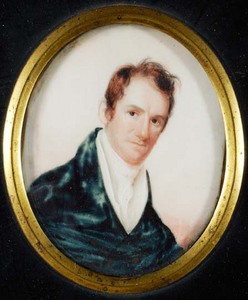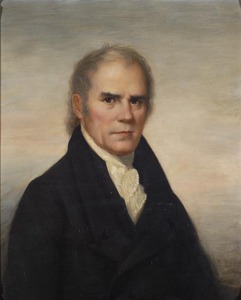“To serve the purpose of their party”
Over the past couple of days, I’ve been quoting letters to the newspapers of Litchfield, Connecticut, about papermaker Elisha Horton’s conversations with his employer, Julius Deming, around the election of 1804.
Horton stated in court and in the press that Deming told him to vote his conscience. Four other people said Horton had complained to them at the time that he was afraid to vote Republican out of fear Deming would fire him and/or shut down the paper mill.
What could make this situation more difficult? Religion! As I noted back here, Horton and his wife were founding members of Litchfield’s Methodist Episcopal Society.
A week after printing Horton’s letter about Election Day, the Federalist Litchfield Monitor evidently ran a piece arguing that the man’s “brethren, who are Methodists, believe him to be a pious, honest, sober citizen for they have proved him and known his ways…”
That 5 Feb 1806 issue of the Litchfield Monitor isn’t in the newspaper database I can access, if it survives at all. I’m quoting from the 5 March Witness, the town’s Republican newspaper.
That issue of the Witness published a letter from four men; one of them, John Stone, had already written to contradicting Horton’s account of 1804. Together those men certified “That said Horton for two years past, or more, has not been considered by the Methodist society in this town as a member of said society.”
The Litchfield Monitor responded on 12 March with two letters. The first said that Horton was being “assailed with all the malice of Democracy, because he was too honest to sell himself to the tools of Alexander Wolcott.” Those four Methodists had written about Horton’s church membership merely “to serve the purpose of their party.”
Alexander Wolcott (1758-1828) was the leader of Connecticut’s Republicans. That year he accused the Federalists of having “priests and deacons, judges and justices, sheriffs and surveyors, with a host of corporations and privileged orders, to aid their elections.” There was no love lost between the parties.
Then came a letter from Horton himself, declaring
It appears that everyone in Litchfield now knew the real situation. Horton felt dependent enough on Deming that not only had he stopped voting for Republicans, but he also refused to acknowledge feeling any pressure from Deming. This was, after all, before secret ballots.
Later in 1806, Deming sold the paper mill to the partnership of Federalist lawyer Aaron Smith, shopkeeper Timothy Peck, and Horton. After two years Peck and Horton bought Smith out. That evidently restored the papermaker’s political independence.
Life in Litchfield went on. The Federalists lost power nationally, then even in New England. Horton retired from the mill. The election of 1824 shook up the national parties, producing a new duality of Democrats and Whigs.
When Horton died in 1837, the Litchfield Enquirer praised him as a “revolutionary officer” and a veteran of the Boston Tea Party. It also said, “As in ’75, so in ’37, he was a zealous and staunch whig.”
Horton stated in court and in the press that Deming told him to vote his conscience. Four other people said Horton had complained to them at the time that he was afraid to vote Republican out of fear Deming would fire him and/or shut down the paper mill.
What could make this situation more difficult? Religion! As I noted back here, Horton and his wife were founding members of Litchfield’s Methodist Episcopal Society.
A week after printing Horton’s letter about Election Day, the Federalist Litchfield Monitor evidently ran a piece arguing that the man’s “brethren, who are Methodists, believe him to be a pious, honest, sober citizen for they have proved him and known his ways…”
That 5 Feb 1806 issue of the Litchfield Monitor isn’t in the newspaper database I can access, if it survives at all. I’m quoting from the 5 March Witness, the town’s Republican newspaper.
That issue of the Witness published a letter from four men; one of them, John Stone, had already written to contradicting Horton’s account of 1804. Together those men certified “That said Horton for two years past, or more, has not been considered by the Methodist society in this town as a member of said society.”
The Litchfield Monitor responded on 12 March with two letters. The first said that Horton was being “assailed with all the malice of Democracy, because he was too honest to sell himself to the tools of Alexander Wolcott.” Those four Methodists had written about Horton’s church membership merely “to serve the purpose of their party.”
Alexander Wolcott (1758-1828) was the leader of Connecticut’s Republicans. That year he accused the Federalists of having “priests and deacons, judges and justices, sheriffs and surveyors, with a host of corporations and privileged orders, to aid their elections.” There was no love lost between the parties.
Then came a letter from Horton himself, declaring
Within two years last past, the Methodists…made application to me to become their Leader. . . . I told them that my business was such, that I could not conveniently attend their meetings on week day, and that my constitution would not admit of my being out so far from home in the night, &c.Another of the certificate signers, Horton said, had carried his contribution to “a poor Methodist Preacher” in a distant town. He concluded:
I have repeatedly attended their Sabbath preaching, and have cast in my mite at their contributions, and had requested John Stone several years ago to call on me when there were any collections to be made.
I am grieved to the heart, to find that men can be so infatuated as to testify as they and others have done, with the notorious design, to wound my feelings, and to murder my reputation.—I do not write this to prejudice you against them, but to let you know how far I am innocent as to what they have testified.Horton did not, however, attempt to directly deny what Stone and others had written about his dilemma in 1804.
It appears that everyone in Litchfield now knew the real situation. Horton felt dependent enough on Deming that not only had he stopped voting for Republicans, but he also refused to acknowledge feeling any pressure from Deming. This was, after all, before secret ballots.
Later in 1806, Deming sold the paper mill to the partnership of Federalist lawyer Aaron Smith, shopkeeper Timothy Peck, and Horton. After two years Peck and Horton bought Smith out. That evidently restored the papermaker’s political independence.
Life in Litchfield went on. The Federalists lost power nationally, then even in New England. Horton retired from the mill. The election of 1824 shook up the national parties, producing a new duality of Democrats and Whigs.
When Horton died in 1837, the Litchfield Enquirer praised him as a “revolutionary officer” and a veteran of the Boston Tea Party. It also said, “As in ’75, so in ’37, he was a zealous and staunch whig.”




